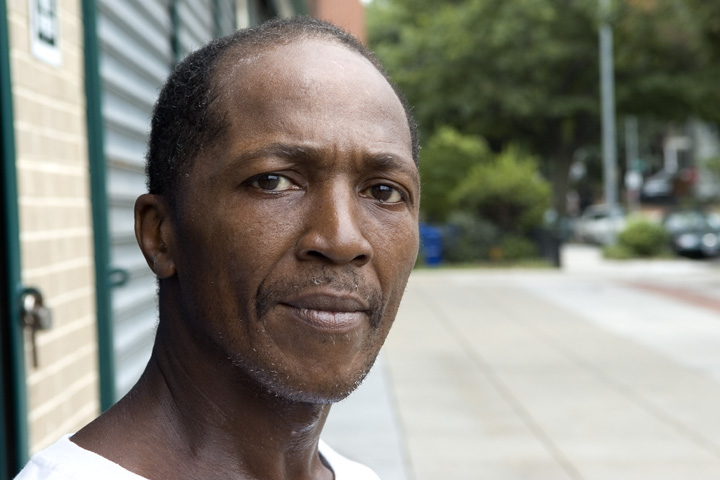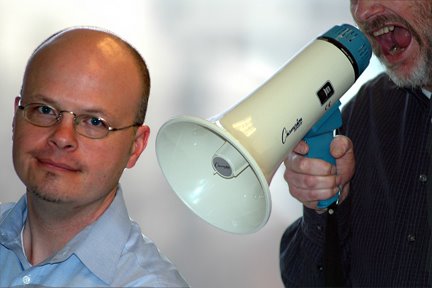Randolph Harris: Poet
 (CLICK TO ENLARGE) Randolph Harris at H and 8th Streets NE. July 29, 2006. (Copyright © 2006. David Klavitter)
(CLICK TO ENLARGE) Randolph Harris at H and 8th Streets NE. July 29, 2006. (Copyright © 2006. David Klavitter)The photography component of Quest for Quiet typically garners the most stares and questions at the intersection of H and 8th Streets NE. I’ve met and spoken with many people, most of whom I meet again at the bus stop or walking to an H Street store.
During a rainy—and amplifier-free—Saturday in April, one fellow watched as I knelt in the gutter to make a photograph. As I clambered back onto the sidewalk, we exchanged hellos. His name was Randolph Harris.
His question about why I photographed in the rain was difficult to answer in the absence of the familiar amplified men. I explained simply that I was a writer and photographer working on a community project.
Harris was not a big man. The water wrung from his soaked tennis shoes each time he shifted his weight from one foot to the other. I’d not seen him in the neighborhood before, and asked where he lived.
Harris said he was homeless at the moment, staying in shelters and on the street. He went to prison in 1985, and was just released after serving a 21-year sentence for trafficking heroin and cocaine. He didn’t stay in touch with family or friends while incarcerated. When he got out, Harris discovered most were dead or gone.
“They just opened the prison door and there I was—in a strange, new land,” he said. “I didn’t know what to do.”
Harris wouldn’t disclose his age, but said he grew up in the H Street area during the 1950s and “wild” 60s. He had no better place to go than old neighborhood. “It’s all changed.”
Then he said, “I’m a writer, too. I write poetry.”
I asked what his poems were about.
“I write about what I feel,” he said. And off the top of his head Harris closed his clear brown eyes and recited a poem he said he wrote in prison in 2000 after watching a television program about reparations.
40 Acres and a Mule
I’m I the blame for what I do
Or should I look at the psychology
of this slavery thing too—
Slavery labeled me three-fifths of a man,
that’s the thing I can’t understand—
Do I not walk upright as he do—
Do I not put on my clothes the same way too
So our sisters’ hue are darker than yours
But that does not give you the right
to label them whores—
You see I know
you once passed a law
so our children wouldn't read
because you wanted them to pick
your tobacco and grow your feed
and your prostituted our children,
our mothers and our wives—
But when the males complained,
you took their lives—
But if I was the animal
you so viciously claim
I’ll have a knife and a gun
and draw blood from your veins—
But being that I come from civilized land
with superior knowledge
I somehow understand—
You see I will forgive but never forget
How we were lied to and cheated
and how you never paid your debt…
forty acres and a mule.
(Copyright © 2000. Randolph Harris. Reprinted with permission.)
I was amazed that Harris so easily could recite the words from memory. He said he'd written others, but couldn't remember those as well.
We chatted in the rain for a while longer, and Harris mentioned that he was hungry. Then I proposed an idea: Would Harris allow me to pay him for the right to publish his poem on Quest for Quiet? He was thrilled about the idea of the business transaction and being a published poet.
Neither of us had paper or pen, so I advanced Harris the money with the commitment that he’d write out the poem for me. We exchanged goodbyes and Harris headed to McDonald’s with his poetry money. As I walked the few steps to my house, I didn’t even want to think I’d never see Harris again or that he wouldn’t make good on his poem.
During the next several months, I’d bump into Harris at the bus stop, on the bus or around the neighborhood. Each time he reminded me that he owed me words to his poem, but we never had time for him to write it down. Then I didn’t see Harris for a long time—until one Saturday in July, while I photographed the usual amplified fellows.
We exchanged hearty greetings, and Harris explained that he’d been sick and was hospitalized at Howard University Hospital. He’d had a bout with pneumonia and some other complications. Then he asked if I had some paper and a pen. And finally we both had time.
 Harris sat in the din of the amplified ranting and recorded his poem on paper as I made a few photographs. When finished, he asked that I mention others could reprint his poem in exchange for donations. I assured him I would ask people contact me so I could put them in touch with Harris to make arrangements. If interested, please email me.
Harris sat in the din of the amplified ranting and recorded his poem on paper as I made a few photographs. When finished, he asked that I mention others could reprint his poem in exchange for donations. I assured him I would ask people contact me so I could put them in touch with Harris to make arrangements. If interested, please email me.


0 Comments:
Post a Comment
<< Home